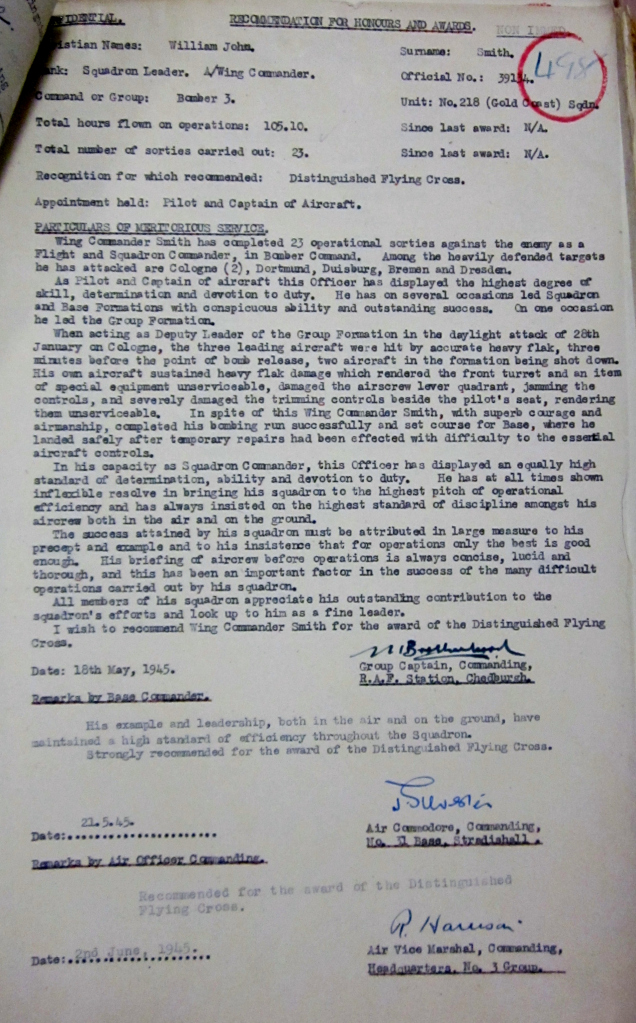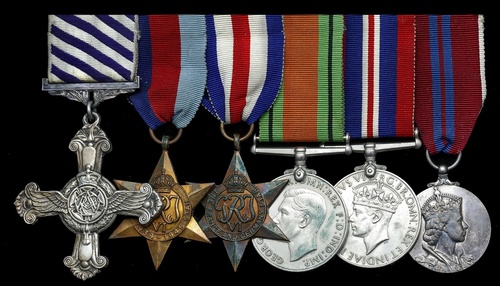
Wing Cdr William John Smith DFC joined the RAF as a pilot under training in the summer of 1936 and, having been commissioned Pilot Officer in July 1937, joined No 52 (Bomber) Squadron at RAF Upwood. The squadron was equipped with Hawker Hinds. He was promoted to Flying Officer in April 1939.
Promoted Flight Lieutenant in September 1940 whilst serving at Cranwell, he was posted to Canada as an instructor in September 1941, and remained similarly employed until returning home in May 1943.
He was promoted to Squadron Leader and took command of ‘B’ Flight in No 115 Squadron, a Lancaster unit operating out of RAF Witchford, in August 1944. Their first sortie was on 4 August 1944 against the oil storage facility at Bec-d’Ambes. He completed a series of fourteen further operational day and night sorties to targets in France, seven of them in the same month, in addition to a strike on Bremen on the 18th.
In September he led his Flight to Le Havre on two occasions, to Calais and to Kemen, and in October to Saarbrucken, Dortmund and Duisburg.
Again promoted to the temporary rank of Wing Commander in the same month, he was next appointed to the command of No 218 (Gold Coast) Squadron, another Lancaster unit, operating out of RAF Chedburgh.
It was here that he displayed ‘inflexible resolve in bringing the Squadron to the highest pitch of operational efficiency‘ and ‘insisted on the highest standard of discipline amongst his aircrew both in the air and on the ground‘. On the ground at least, that resolve may have proved unpopular in certain quarters, but Smith’s personal example in the air was imbued with all the hallmarks of exceptional leadership and courage; his ‘concise, lucid and thorough‘ pre-raid briefings were conducted from a pulpit-like podium and led to his nickname – ‘The Vicar’.
The burdens of squadron command clearly took their toll during his time in 218 Squadron: he was admitted to Ely Hospital, Cambridgeshire in December 1944.
On returning to an operational footing in January 1945 – and as cited in the recommendation for his DFC (see below) – he acted as Deputy Group Leader in a daylight strike on Cologne and displayed ‘superb courage’ in continuing to the target after his Lancaster was severely damaged by flak; in the following month, he led 218’s attack on Dresden on the night of the 13th-14th, the first of four successive strikes on the city that culminated in the notorious ‘firestorm’ and an estimated total of 22,000 casualties. He flew his final sortie as Squadron CO on the night of 14th-15th, when 218 Sqn attacked Datteln.
Smith ended the war with an appointment at No 3 Group, Bomber Command.
Allen Clifford recalls Smith in his book “One of Butches Boys”:
The squadrons new C/O, was known as the Vicar since he took to addressing us at briefing from a specially constructed pulpit-like podium”
Ron Warburton praises Smith in his memoire “Ron’s War”:
“My squadron is the best in Bomber Command, and our standards are very high. We were chosen frequently to lead attacks on Germany by day and night”
Squadron Leader Martindale stated in a letter that “Wing Commander Smith was a capable and very fine officer and commander”.
Wing Commander Smith was awarded the DFC in November 1945 (LG13.11.1945) and remained in the RAF until he retired in 1958. The citation read:
‘When acting as Deputy Leader of the Group Formation in the daylight attack on Cologne on 28 January 1945, the three leading aircraft were hit by accurate heavy flak, three minutes before the point of bomb release, two aircraft in the formation being shot down. His own aircraft sustained heavy flak damage which rendered the front turret and an item of special equipment unserviceable, damaged the airscrew lever quadrant, jamming the controls, and severely damaged the trimming controls beside the pilot’s seat, rendering them unserviceable.
In spite of this Wing Commander Smith, with superb courage and airmanship, completed his bombing run successfully and set course for base, where he landed safely after temporary repairs has been effected with difficulty to the essential aircraft controls … ‘
Below is copy of the DFC recommendation for Wing Commander Smith. This document records a very capable and determined commanding officer, the comments made by Group Captain Brotherhood confirm this.

Smyth joined the Lodge in 1963 aged 50. quickly asked to fill the Wardens chairs he was installed as Worshipful Master in 1965. He was secretary from 1969 to 1972 ad DC from 1972 to 1977.
He was Assistant Secretary of the RMBI.
Wing Commander Smith DFC passed away March 2004 in Wokingham.
